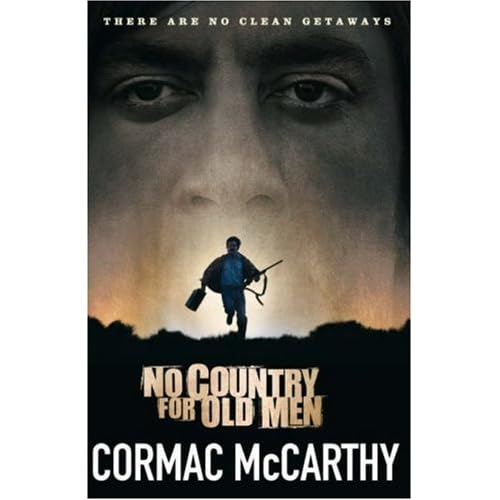 Alas I will have to wait.
Alas I will have to wait.And so it was that midweek, MG Harris said she'd spotted her book Invisible City on the shelves in Oxford (two weeks early), and I raced out to the local Waterstones to see if I could buy it too. And again, the local businesses let me down. But instead I stumbled upon Cormac McCarthy's No Country for Old Men. Hazarr!
Bought it half price too, and finished just minutes before we did last night's Litopia podcast.
I'm in two minds over the book itself, or is that I'm in one mind over the book and in another mind regarding the writer?
The book is constructed in two separate povs. Since the title and the subject of the piece regard Sheriff Bell (Tommy Lee Jones in the movie) we open with a monologue of his:
I sent one boy to the gas chamber at Huntsville. One and only one. My arrest and my testimony. I went up there and visited with him two or three times. Three times. The last time was the day of his execution. I didn't have to go but I did. I sure didn't want to. He'd killed a fourteen year old girl and I can tell you right now I never did have no great desire to visit with him let alone go to his execution but I done it. The papers said it was a crime of passion and he told me there wasn't no passion to it. He'd been datin' this girl, young as she was. He was nineteen. And he told me that he had been plannin' to kill somebody for about as long as he could remember. Said that if they turned him out he'd do it again. Said he knew he was goin' to hell. Told it to me out of his own mouth. I don't know what to make of that. I surely don't. I thought I'd never seen a person like that and it got me to wonderin' if maybe he was some new kind.And then we slide into the chapter proper, with a third person pov that allows us to shift easily between characters at separate locations. It's all good stuff, nice and simple prose that any reader can understand without too much concentration, and yet in these main narrative moments I was driven to great distraction by McCarthy's choice of structuring:
He ran cold water over his wrists until they stopped bleeding and he tore strips from a hand towel with his teeth and wrapped his wrists and went back into the office. He sat on the desk and fastened the toweling with tape from a dispenser, studying the dead man gaping up from the floor. When he was done he got the deputy's wallet out of his pocket and took the money and put it in the pocket of his shirt and dropped the wallet to the floor. Then he picked up his air tank and the stun gun and walked out the door and got into the deputy's car and started the engine and backed around and pulled out and headed up the road.How can I recommend this book to anyone when every other word is surely and? It isn't easy.
And yet through this style we know exactly what and where and how - but it doesn't half begin to grate! Use a comma, a full stop or something... please?
The next problem for the reader lies in the lack of quotation marks for dialogue (single or double). Narrative runs into dialogue and others follow without attribution to characters, often leaving a lazy reader (or tired, as I was) a little lost, and in need of some backtracking.
And yet, the story is cracking and the idiosyncrasies of the characters bring them alive enough that any hate I had for McCarthy's style had to be endured to find out what happened next - and I was surprised by the turns in the story. I'm not sure if I like the direction it took at the end (but I guess that's what you get when you're riding shotgun with a writer like McCarthy).
I can recommend this on story and character alone - it may be better just to watch the movie (at least that is up for Oscars). And on a side note, I do enjoy watching the trailer for a movie and then reading the book, all the characters are fleshed out for me - it helps that the movie seems to follow the book faithfully (don't get me started on I Am Legend).
1 comment:
Chigurah's narrative didn't bother me at all. As a matter of fact, I rather liked it. It fit perfectly his pathological personality.
Post a Comment